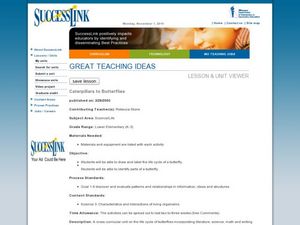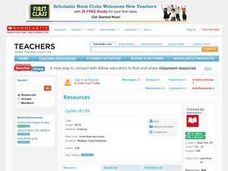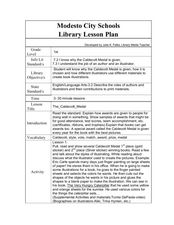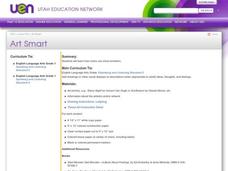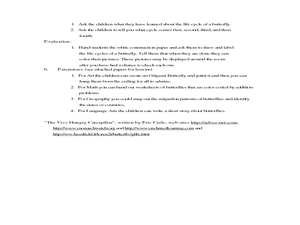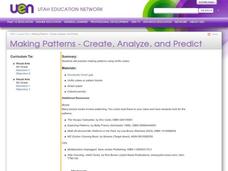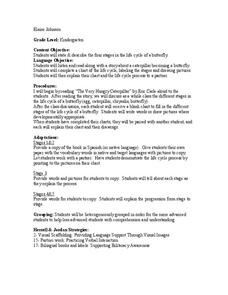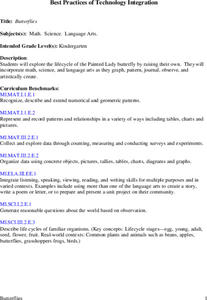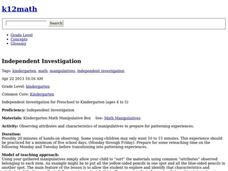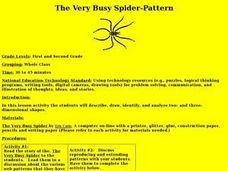Curated OER
"Caterpillars to Butterflies"
Students participate in a variety of activities about how caterpillers become butterflies.
Curated OER
Life Cycle of a Butterfly
Students complete a variety of exercises involving butterflies and their life cycle.
Curated OER
Peter The Butterfly
Students complete an interdisciplinary unit chronicling the life cycle and movement patterns of the butterfly. Through language arts, mathematics, and science activities, students identify various types of butterflies and document the...
Curated OER
Observing Plants
Students identify how plants affect the survival of a caterpillar and what plants need to survive. They plant three bean seeds in the three containers, placing two containers at a sunny window and the third one in a dark closet and label...
Curated OER
Cycles of Life
Students explore the metamorphosis of an insect as it changes from an egg to pupa to an adult. the process of change is observed, recorded, and transformed into a life cycle picture.
Curated OER
Authors and Illustrators: What do they do?
Help readers understand the roles of authors and illustrators and why they have been recognized by medals of excellence. Your class will discuss and then create illustrations for a book. When they have finished, you can hold your own...
Curated OER
Insects
It's a fact: kids love bugs! With this lesson, young learners explore reading informational texts and conducting research while learning about their favorite insects. Spark learners' interest by reading a book about one kind of bug and...
Curated OER
Metamorphosis Magic
Students make different motions for each stage in the butterfly life cycle and plant a garden. In this butterfly life cycle lesson plan, students can take the mini gardens home and discuss how butterflies help gardens.
Curated OER
Stick Out Your Tongue
Students explore their sense of taste and recognize good foods to eat. For this tasting lesson, students recognize that their tongue has taste buds for different types of tastes. Students create a bar graph showing their favorite taste (...
Curated OER
The Lifecycle of a Butterfly
Students study the life cycle of the butterfly. For this butterfly life cycle lesson, students examine and discuss a large diagram of the four stages of the butterfly life cycle. They read books and access web sites that extend their...
Curated OER
Seasonal Science: Spring Life Science Activities
Spring into science with these great lesson ideas involving butterflies.
Curated OER
Beautiful Bugs
Students investigate the life cycle of ants, ladybugs, and butterflies. They list the four stages of the butterfly life cycle, define symmetry and observe how ants make homes in dirt.
Curated OER
Hatched From An Egg
Students discover how animals are born/hatched. In this life science lesson, students listen to a book entitled Chickens Aren't The Only Ones, and discuss animals that are hatched or born. Students receive a picture of an animal,...
Curated OER
Rooster's Off To See the World Number-Sense
Students recognize how numbers are used in number stories. In this Rooster's Off To See the World lesson, students participate in the story. Students complete a number activity and work on the computer to illustrate a number...
Curated OER
Making Patterns - Create, Analyze, and Predict
Fourth graders practice making patterns using Unifix cubes and identify, analyze, and determine rules for describing numerical patterns involving operations and nonnumerical growing patterns. They also find an example of a pattern in...
Curated OER
Paper Art
Students investigate the various techniques that studenT book illustrators utilize such as paper collage, die-cut pages, and object stencils for relief printing.
Curated OER
KWL Chart: Living and Non Living
In this KWL chart worksheet, students fill in this graphic organizer about living and non-living things. Students complete 3 sections in the chart.
Curated OER
Paste Paper
Young scholars watch the teacher demonstrate the process of making paste paper. They create their own wheat paste papers following the example of the teacher. Students make several pieces of paste paper, and use them to make collages.
Curated OER
Butterfly Bonanza
Students describe life cycle of the butterfly after reading and singing about butterflies.
Curated OER
Butterfly Life Cycle
Pupils describe and state the four stages of the life cycle of a butterfly. In this life cycle lesson plan, students copy words and pictures from the life cycle and then identify each stage.
Curated OER
Butterflies
Learners will explore the life cycle of the Painted Lady butterfly by raising their own. They will incorporate math, science, and language arts as they graph, pattern, journal, observe, and artistically create.
Curated OER
Independent Investigation
Students classify objects. In this math lesson, students sort and classify objects based on their characteristics. Students identify characteristics of objects.
Curated OER
The Very Busy Spider-Pattern
Students explore two- and three-dimensional shapes. In this very busy spider lesson, students read the story and then create a spider web pattern of their own. The webs must use a symmetrical pattern. Additional activities...


